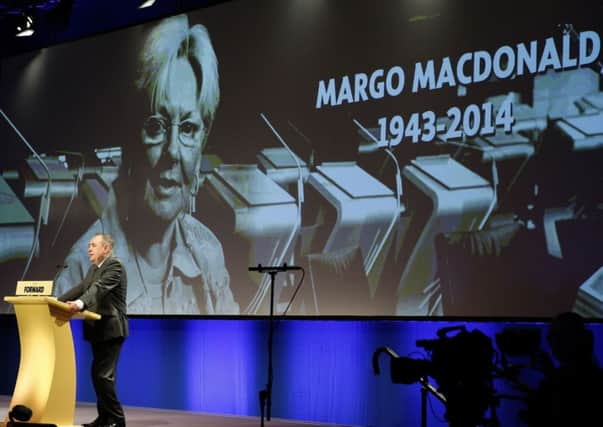Salmond: ‘Work begins the day after a Yes vote’


In his keynote speech to the last SNP conference before the referendum on 18 September, the First Minister will tell delegates that once the campaign rhetoric is over, the hard work will start.
Addressing an audience in Aberdeen, in the week that his party celebrated its 80th anniversary, Mr Salmond will outline plans to appoint a team of negotiators who will begin talks with Westminster about the dissolution of the United Kingdom within days of a vote for independence.
Advertisement
Hide AdAdvertisement
Hide AdAmerican Nobel prize-winning economist Joseph Stiglitz, part of Mr Salmond’s fiscal commission, is one of the non-political experts who could be asked to take part.
Mr Salmond’s claim that politicians from different parties would be involved also raises the prospect that senior figures from the coalition government – including those masterminding the unionist campaign, such as Chief Secretary to the Treasury Danny Alexander and Scottish Secretary Alistair Carmichael –may be invited into Scotland’s corner on 19 September.
Mr Salmond will unveil his plan in a keynote address to the SNP conference in Aberdeen this afternoon.
He will say: “Following a Yes vote on 18 September, that work will begin.
“An all-party ‘Team Scotland’ negotiating group, including non-SNP members will be convened. It will secure expertise from across the political spectrum and beyond – and from Scotland and beyond.
“That group will begin negotiations with Westminster before the end of September. The discussions will be held in accordance with the principles of the Edinburgh Agreement.
“And on 24 March 2016, Scotland will become an independent country and join the international family of nations.”
The speech will be used as an olive branch to the other pro-Union parties in Scotland by Mr Salmond, who will say the SNP may not be leading Scotland after independence is formally declared.
Advertisement
Hide AdAdvertisement
Hide AdHe is expected to add: “This referendum is not about this party, or this First Minister, or even the wider Yes campaign.
“It’s about putting Scotland’s future in Scotland’s hands.”
Yesterday, more than 1,200 supporters gathered in the Granite City heard Deputy First Minister Nicola Sturgeon say that independence has never been nearer and that “the last mile of our journey is upon us”.
She hailed the referendum as the “biggest and best opportunity we will ever have to build a better country”, adding: “Here we are, standing at last on the threshold of our nation’s independence.”
The First Minister will insist that a Yes vote will secure a government “that the people of Scotland choose, pursuing policies the people of Scotland support.”
He will add: “A government in control of tax, the economy, social security, employment, immigration, oil and gas revenues, European policy and a range of other areas currently under Westminster control.
“That may be the SNP. It may be Labour. It may be a coalition.”
But the prospect of the Conservatives being in charge seems unlikely, with the coalition’s policies on the welfare state and public services coming in for particular criticism.
Mr Salmond will add: “In an independent Scotland we can give this guarantee. The era of unelected Tory governments handing out punishment to the poor and the disabled will be gone and gone for good.”
Advertisement
Hide AdAdvertisement
Hide AdThe SNP leader will tell the party it can help build a “prosperous and just society” if voters back independence in the referendum later this year.
Yesterday, during a debate celebrating the 80th anniversary of the party, Mr Salmond told the audience: “We look forward this year to the flowering of our nation, to the fulfilment of the hopes and dreams that we’ve had and carried with us for so long.”
The First Minister said that the SNP records show that its first conference in 1934 saw former Scottish Labour leader Robert Cunninghame Graham elected the party’s first president. He added: “That reminds us of a continuing thread throughout these 80 years that this is not an ordinary political party.
“We’re a highly successful party, but we’re not an ordinary political party, because we are always and always have been and in this year above all we are part of a movement.
“That aim, that ambition, is the freedom and independence of our country.”